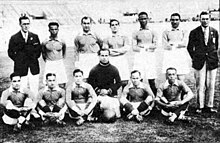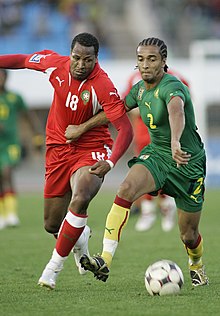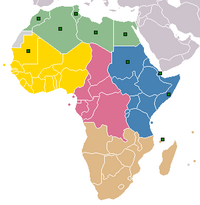Portal:Football in Africa
Introduction
Football is the most popular sport in Africa. Indeed, football is probably the most popular sport in every African country, although rugby and cricket are also very popular in South Africa. (Full article...)
This section may be unbalanced toward certain viewpoints. (October 2022) |

Selected article -

The Union of North African Football (UNAF; Arabic: اتحاد شمال إفريقيا لكرة القدم, romanized: Ittiḥād Shamāl Ifrīqyā li-Kurat al-Qadam; French: Union nord-africaine de football) is an association football organising body. It was launched in 2005 by the North African members of the Confederation of African Football (CAF), Algeria, Egypt, Libya, Morocco and Tunisia. The post of president will be rotated among the five founding nations.
Selected biography -
Ayew began his career in Ghana, playing for Nania, while debuting for the club at age 14. In 2005, he signed with his father's former club, Marseille, and spent two seasons in the club's youth academy before making his debut in the 2007–08 season. Ayew spent the following two seasons on loan with Lorient and Arles-Avignon, helping the latter team earn promotion to Ligue 1 for the first time. In 2010, he returned to Marseille and became an integral part of the first team under manager Didier Deschamps, making over 200 appearances and winning consecutive Trophée des champions and Coupe de la Ligues in both 2010 and 2011.
Ayew has been a full international for Ghana since 2008 and has earned over 65 caps. At youth level, he starred for and captained the under-20 team that won both the 2009 African Youth Championship and the 2009 FIFA U-20 World Cup. He has played in two FIFA World Cups (2010 and 2014), as well as five Africa Cup of Nations (2008, 2010, 2012, 2015 and 2017), helping them finish runner-up in 2010 and 2015 (in which he was also top goalscorer).
Selected image -
 |
Fans of the Angola national team cheer on their side during their quarter-final clash against Egypt at the 2008 Africa Cup of Nations. The Angola national team is controlled by the Angolan Football Federation, and qualified for a World Cup finals for the first time in 2006, where they were eliminated after one defeat and two draws in the group stage.
Subcategories
Related portals
More sports portals
WikiProjects
Related task forces and sub-projects
African football task force
WikiProject Africa • WikiProject Football
WikiProject Football task forces and sub-projects
 | |
| Wikipedia ads | file info – #250 |
Topics
Open tasks

- Expand stubs: Competitions in Africa • Organizations
- Expand club articles of teams from Africa.
- Expand biographies of Africans involved in football.
- Create: Requested articles • Most wanted football articles • Requested general football articles
- Add: Infoboxes • Images (General requests, Requested images of people)
- Review: articles currently under review
- Assess: Assessment requests • Assess an article
- Revert vandalism on this portal and on African football articles
- Assist in maintaining this portal and keeping its selected content up to date.
- WikiNews: Create and submit news stories about African football for Wikipedia's sister project WikiNews.
Associated Wikimedia
The following Wikimedia Foundation sister projects provide more on this subject:
-
Commons
Free media repository -
Wikibooks
Free textbooks and manuals -
Wikidata
Free knowledge base -
Wikinews
Free-content news -
Wikiquote
Collection of quotations -
Wikisource
Free-content library -
Wikiversity
Free learning tools -
Wiktionary
Dictionary and thesaurus
More portals
Sources

- ^ "The History Of Soccer In Africa". NPR.org. 2010-06-09. Retrieved 2016-03-31.
- ^ a b c Alegi, Peter (2010). African Soccerscapes. Ohio University Press. pp. 1–2. ISBN 9780896802780.
- ^ Frimpong, Enoch Darfah. "Ghana news: A world of superstition, frustration and disillusionment - Graphic Online". Retrieved 23 September 2017.
- ^ Lacey, Marc (8 August 2002). "Kangemi Journal; For Spellbinding Soccer, the Juju Man's on the Ball". The New York Times. NY Times. Retrieved 2016-03-31.
- ^ "World Cup Witchcraft: Africa Teams Turn to Magic for Aid". National Geographic. Archived from the original on July 10, 2006. Retrieved 2016-03-31.
- ^ Andy Mitten (September 2010). The Rough Guide to Cult Football. Rough Guides UK. ISBN 9781405387965. Retrieved 2016-04-02.
- ^ "African Nations Cup overshadowed by hocus pocus | Football". The Guardian. Retrieved 2016-04-09.
- ^ Kuper, Simon (2006). Soccer Against the Enemy: How the World's Most Popular Sport Starts and Stops Wars, Fuels Revolutions, and Keeps Dictators in Power. Nation Books. p. 123. ISBN 978-1-56025-878-0.

























